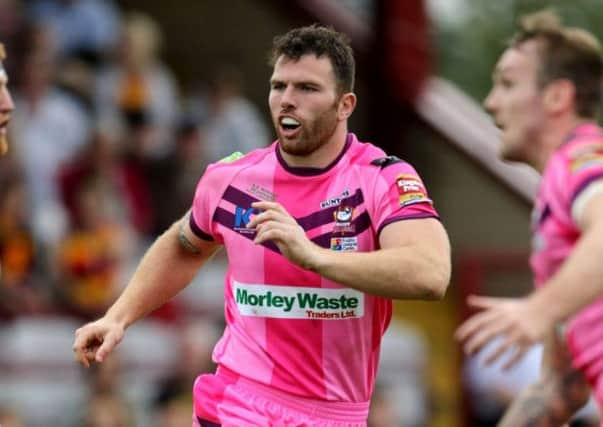Can Keegan Hirst’s courage help to level the playing field?


KEEGAN Hirst has said he thought “the world would end” if someone found out he was gay. The rugby league player admitted contemplating suicide as he wrestled with a secret that led to the break-up of his marriage.
“I had a wife and kids,” he said. “I’ve been a builder, doorman, worked in factories, I play rugby. I tick every macho box. How could I be gay? I’m from Batley for goodness sake. No one is gay in Batley.”
Advertisement
Hide AdAdvertisement
Hide AdYet when he opened up about his sexuality at the weekend, the 27-year-old quickly found himself the beneficiary of a wealth of support from his Batley Bulldogs team mates and fans, as well as high-profile figures both from within the sport and beyond.
Not every sporting personality has found the reception quite so welcoming, however. When Justin Fashanu’s then manager Brian Clough discovered he was gay, he responded by banning the striker from training with the team. In his autobiography, Clough recounts a dressing down he gave Fashanu after hearing rumours that he was going to gay bars. “‘Where do you go if you want a loaf of bread?’ I asked him. ‘A baker’s, I suppose.’ ‘Where do you go if you want a leg of lamb?’ ‘A butcher’s.’ ‘So why do you keep going to that bloody poofs’ club?’”
Fashanu would later suffer the taunts of supporters and fellow players alike after coming out to the tabloid press. In the wake of being accused of sexual assault in 1998 he took his own life, a scribbled suicide note revealing the fear that his homosexuality would mean he could never receive a fair trial.
The plaudits for Hirst, who led his team out at the Fox’s Biscuits stadium in Batley last Sunday as the first British rugby league professional to come out as gay, suggest attitudes within sport are now changing.
Advertisement
Hide AdAdvertisement
Hide AdIn recent years the likes of former Wales rugby union captain Gareth Thomas and Olympic diver Tom Daley have also drawn praise for their courage in speaking out.
Yet Kim Sanders, from the gay and lesbian charity Stonewall, says the sporting world is still a tough environment in which to be openly gay.
“Although there are role models like Tom Daley and (former Leeds United player) Robbie Rogers, it is still hard for sportspeople to come out. There is an expectation that if you do you will experience discrimination. As Keegan Hirst has said, it was a real struggle for him because of that.”
Some sports seem more problematic than others. Recently, Michael Sam became the first gay American footballer to win a place in the NFL. Yet he announced last week that he is temporarily quitting the sport after a “difficult year”. Meanwhile, the New Orleans Saints player Jonathan Vilma was criticised for saying he would not want a gay team mate.
Advertisement
Hide AdAdvertisement
Hide AdTellingly, there has yet to be an openly gay top-flight player in English football since Justin Fashanu came out in 1990. The closest has been German international Thomas Hitzlsperger, who formerly played for Aston Villa. Yet he waited until retirement, saying it would have been impossible to say he was gay while he was still playing.
“I was never ashamed of being who I am but it was not always easy to sit on a table with 20 young men and listen to jokes about gays,” he said. “Fighting spirit, passion and winning mentality are intrinsically linked, that doesn’t fit the cliché: ‘Gays are soft’”.
While significant, Kim Sanders believes that Keegan Hirst’s decision to open up about his sexuality is only part of the battle. “Having more visible role models is important, especially for young fans. But it goes deeper than that.
“More than six in 10 gay and bisexual men and four in 10 lesbian and bisexual women expect to experience homophobia if they take part in a team sport and are open about their sexual orientation. That shows sport at every level still has a long way to go.”